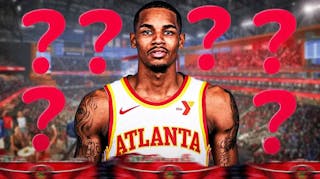When they met at Oracle Arena on April 5th, 2016, the Minnesota Timberwolves were lottery-bound for a twelfth straight season, while the Golden State Warriors were making history, en route to what seemed like an imminent second consecutive Larry O'Brien Trophy.
The early portion of the game made the teams' wildly disparate circumstances abundantly clear to even the most casual viewers. Golden State jumped out to a 25-10 lead over Minnesota, confusing interim coach Sam Mitchell's young team with a maze of backdoor cuts and off-ball screens that left defenders clueless. Harrison Barnes, starting at small forward for Steve Kerr, had 18 points in the first half alone as the Warriors racked up 18 assists and shot 50 percent from the field, leading 55-46 at intermission.
The Timberwolves had already begun righting the ship, though, buoyed by reserve wing Shabazz Muhammad pushing the ball at every opportunity, taking advantage of Golden State's increasingly lackadaisical transition defense. He had 10 points in the second quarter, while Karl-Anthony Towns and Andrew Wiggins also began getting comfortable offensively after an ugly opening 12 minutes.
The game's tide turned for good in the third quarter, even though Minnesota was unable to make much of a dent in Golden State's lead. Wiggins, rejuvenated in the halftime locker room, had 12 points in the third, finding his groove by attacking the rim off the dribble. Muhammad scored 12 points, too, draining a corner triple and continuing to put incessant pressure on the paint. Despite falling behind by 17 points midway through the period, the Timberwolves entered the final stanza trailing the Warriors just 76-68.
The fourth quarter was an encapsulation of why Minnesota was, at the time, considered a surefire future title contender. Wiggins, Muhammad, and Zach LaVine picked up the offensive slack of Towns, combining for 20 points as Golden State's penchant for carelessness with the ball, still Kerr's pet peeve, reared its ugly head. The Warriors shot a scorching 10-of-16 in the final stanza, but committed seven turnovers that led to crucial extra opportunities for Minnesota. When Wiggins spun past Andre Iguodala for a beautiful finger roll with just 19 seconds remaining, the Timberwolves' stunning comeback was finally complete, with the game tied at 116-116.
Overtime remained the Wiggins show, as Golden State proved helpless to keep the former No. 1 overall pick out of the paint. He scored nine points in the extra session, draining five free throws, setting the stage for Towns, now considered a defensive liability, to make his case as a future perennial Defensive Player of the Year candidate. The eventual Rookie of the Year shut down Steph Curry after switches on multiple occasions in overtime, using his rare combination of quickness and length to consistently force the reigning MVP into difficult looks. Curry shot just 1-of-7 in overtime, indicative of team-wide struggles prompted by the Timberwolves' energy and versatility on defense.
The result? A 124-117 victory for Minnesota, only the Warriors' second home loss all year – and just their ninth altogether in a season that broke the 1995-96 Chicago Bulls' previously untouchable record of 72 regular-season victories.
Golden State's success in the interim is certainly not surprising, even though it took a different form than anticipated after LeBron James and the Cleveland Cavaliers made history by coming back from a 3-1 deficit in the ensuing NBA Finals. The Warriors always seemed destined for a dynasty back then; the subsequent addition of Kevin Durant just ensured it would last even longer.
If there was a team in the Western Conference most likely to challenge Golden State for supremacy over the years, conventional wisdom said it was Minnesota.
Instead, the team tried to shortcut its way to contention, signing Tom Thibodeau as front office and coaching czar that summer, and the following June trading LaVine, Kris Dunn, and the rights to Lauri Markkanen to the Chicago Bulls in exchange for Jimmy Butler and a mid first-round pick. After the Timberwolves squeaked into the playoffs with a do-or-die victory over the Denver Nuggets in the 2018 regular season finale, Butler forced his way out of town last fall, finally being dealt to the Philadelphia 76ers in a trade that brought Robert Covington and Dario Saric to the Twin Cities. Thibodeau, meanwhile, was fired in January, replaced by interim coach Ryan Saunders.
Minnesota, 10th-place in the Western Conference at 33-41, was eliminated from the postseason earlier this month. Covington hasn't played since New Year's eve, when he suffered a bruise on his right knee that's been slow to heal, the most significant of a rash of injuries to the Timberwolves over the season's second half. Worse? Wiggins' regression in the first year of a max contract extension he signed two summers ago, before the addition of Butler stalled his development into Minnesota's primary ball handler – and the star sidekick Towns needs to take his team to contention.f
This season could mark the end of the Warriors as we know them. Rumors of Durant bailing in free agency have only grown louder of late, and some close to the team believe Golden State might ultimately try and trade Draymond Green. Regardless, the Warriors will enter the postseason as prohibitive title favorites yet again, trying to make history as the third team since the NBA-ABA merger to win three straight titles. The Timberwolves, on the other hand, will go back to the drawing board this offseason, deciding on a new coach to lead them into a future far cloudier than it's ever been before during the Wiggins-Towns era.
Three years is a long time in the NBA. But for Minnesota, its would-be defining win over one of the best teams of all time in April 2016 is an especially foggy, and depressing, memory.




